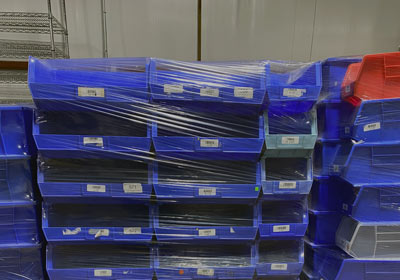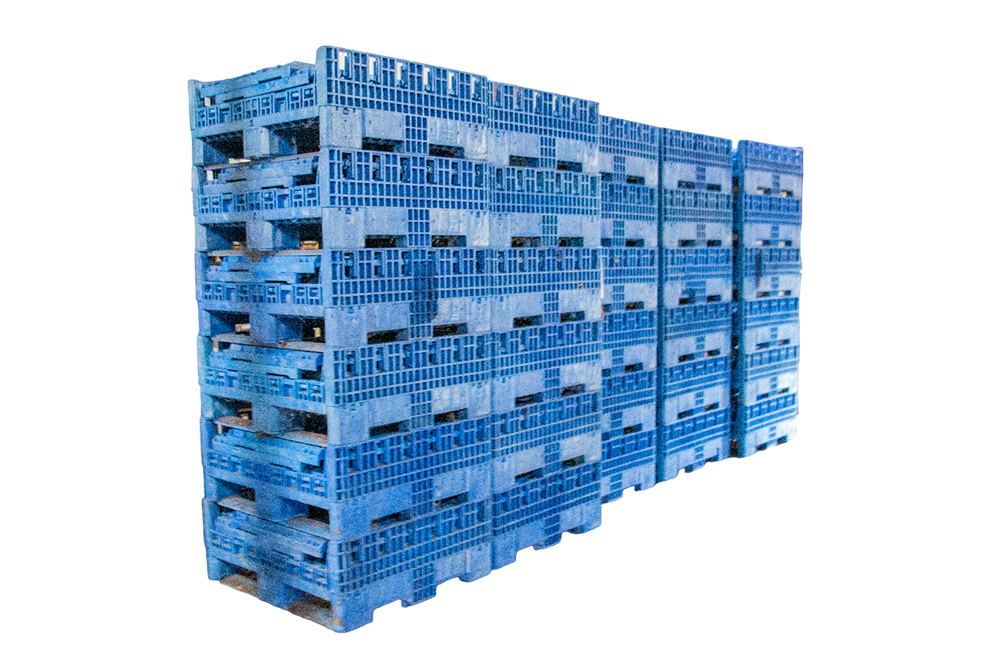Why refurbished bulk containers and used collapsible bulk containers are sustainable assets
Why Bulk Containers Are Important for Sustainable and Cost-efficient Transport
Bulk containers play a necessary duty in contemporary logistics. They help with the reliable movement of big quantities of products, consequently optimizing transport procedures. This approach not just decreases prices yet additionally lessens ecological effect via lower exhausts and waste generation. As industries seek even more sustainable techniques, the adoption of mass containers is ending up being progressively substantial. What effects does this shift hold for future logistics and supply chain management?

The Advantages of Using Mass Containers in Logistics
Mass containers change logistics by enhancing performance and sustainability. These containers permit the transportation of large amounts of goods in a solitary journey, noticeably decreasing the number of trips needed. This not just streamlines procedures however also lessens labor expenses related to handling, packing, and dumping. In enhancement, bulk containers are developed to maximize room utilization within transportation cars, ensuring that even more products can be shipped simultaneously.
The standardization of bulk containers additionally simplifies the logistics process. With uniform measurements, they can be easily piled and stored, leading to improved warehouse management. Bulk containers frequently include sturdy products that shield contents from damages throughout transportation, therefore decreasing item loss and boosting general reliability. Consequently, organizations can experience enhanced supply chain efficiency, ultimately resulting in enhanced profitability and consumer satisfaction. This mix of factors makes bulk containers a vital property in modern-day logistics.
Environmental Impact: Reducing Waste and Carbon Impact
As markets significantly focus on sustainability, the fostering of bulk containers has emerged as an essential approach for lowering waste and reducing carbon impacts. These containers lessen the use of packaging products, such as boxes and plastic, therefore notably decreasing general waste generation. By combining shipments, mass containers enhance transport efficiency, allowing for more products to be carried per journey. This reduction in trips straight correlates with lower greenhouse gas discharges, adding to a smaller carbon footprint.
In addition, bulk containers can frequently be recycled or recycled, better reducing environmental impact. The longevity of these containers warranties they can withstand several transport cycles, reducing the demand for single-use options. used bulk containers. By enhancing logistics and promoting reliable source use, bulk containers not only sustain lasting methods but likewise urge sectors to line up with global environmental objectives. Ultimately, their execution reflects a commitment to eco-friendly stewardship and accountable source management
Cost Savings: Just How Mass Containers Lower Transport Costs
While several companies seek methods to improve their profits, using bulk containers offers a significant possibility for lowering transportation expenditures. Mass containers make best use of the quantity of products transported, permitting businesses to deliver larger quantities at the same time. This performance minimizes the variety of trips called for, straight decreasing fuel costs and reducing labor costs connected with loading and unloading.
Furthermore, bulk containers usually include structured styles that optimize room application within transport cars. This suggests less voids, resulting in much more efficient usage of available capacity. Furthermore, the durability of bulk containers can decrease the risk of item damage during transit, minimizing losses and making certain that more products get here undamaged.
Enhancing Supply Chain Efficiency With Mass Storage Solutions
Mass storage space solutions play an essential role in boosting supply chain effectiveness by enhancing inventory management. By settling items right into fewer, larger containers, companies can considerably reduce managing costs connected with frequent transfers and processing. This structured method allows for far better tracking and management of inventory, ultimately leading to improved functional performance.
Streamlined Supply Management
Reliable stock management is essential for maximizing supply chain procedures, particularly when companies adopt bulk storage solutions. These remedies allow companies to maintain greater stock degrees while decreasing the frequency of replenishment. By settling products into mass containers, companies can improve their supply processes, decreasing the intricacy connected with tracking multiple smaller packages. This strategy assists in exact stock matters and enhances forecasting precision, enabling more enlightened decision-making. Furthermore, bulk storage space options streamline warehouse organization, making it less complicated to find and access items when needed. Therefore, organizations can accomplish an extra reliable supply turnover rate, inevitably boosting general supply chain performance and reducing the probability of stockouts or overstock scenarios.

Decreased Handling Prices
The execution of mass storage services not just enhances inventory administration but additionally considerably decreases handling expenses throughout the supply chain. By combining materials into bulk containers, firms reduce the demand for constant handling and transfer in between different storage and transportation units. This technique minimizes labor prices connected with loading, discharging, and moving smaller packages. Furthermore, mass storage space minimizes the regularity of deliveries, causing reduced transportation costs and lowered fuel consumption. As an outcome, businesses can enhance their logistics procedures, enabling for a more reliable allocation of resources. Inevitably, minimized handling expenses add to enhanced general supply chain efficiency, cultivating an atmosphere that supports both sustainability and economic practicality.

Adaptability of Bulk Containers Throughout Various Industries
Lots of markets have distinctive requirements for transportation and storage space, bulk containers have arised as a functional service that meets a broad range of requirements. These containers, varying from huge bins to specialized containers, can accommodate varied materials, consisting of granules, liquids, and powders. In the farming sector, mass containers facilitate the transport of grains and fertilizers, while the food and beverage sector utilizes them for components and completed products. The chemical sector relies on mass containers for safely carrying harmful products, ensuring compliance with safety regulations. Additionally, construction firms gain from mass containers for transferring aggregates and other materials. Their versatility encompasses different settings of transport, including ships, trucks, and trains, improving logistical efficiency. This versatility not only enhances procedures across different markets yet also promotes sustainability by decreasing packaging waste and enhancing area in transportation. Mass containers play an important duty in modern supply chain monitoring.
Future Patterns wholesale Container Usage and Sustainability
The future of mass container use is significantly formed by ingenious products development that enhances sustainability. Furthermore, automation in logistics promises to streamline procedures, reducing waste and boosting efficiency. Accepting circular economy practices will certainly even more revolutionize exactly how bulk containers are designed, utilized, and reused, promoting a much more sustainable transportation landscape.
Ingenious Products Advancement
As sectors progressively focus on sustainability, innovative materials growth in bulk containers becomes a substantial Click Here variable in improving green transportation remedies. Suppliers and scientists are discovering eco-friendly plastics, recycled compounds, and light-weight metals to lower environmental influence. These materials not only decrease waste however likewise improve fuel performance by reducing the general weight of containers. Furthermore, innovations in wise materials, which can adapt to varying problems, boost the sturdiness and functionality of mass containers. The assimilation of these cutting-edge products aligns with circular economic situation principles, advertising reuse and recycling. As the demand for sustainable techniques grows, the development of such materials will play an essential role in shaping the future of mass container use in logistics and transportation.
Automation in Logistics
Significant developments in automation are positioned to transform logistics and the utilization of mass containers, improving sustainability in transportation. Automated systems, including drones and autonomous automobiles, are enhancing the motion of bulk containers, reducing the reliance on traditional fuel-powered transport. These modern technologies enhance routing and packing procedures, reducing empty miles and enhancing fuel effectiveness. In addition, automated inventory management systems improve monitoring and surveillance of bulk containers, making certain better resource appropriation and lowered waste. The integration of the Net of Things (IoT) permits real-time data evaluation, making it possible for aggressive decision-making that straightens with sustainability objectives. As automation remains to develop, it is anticipated to drive additionally developments wholesale container usage, inevitably sustaining more sustainable logistics practices and minimizing the ecological influence of transportation.
Round Economic Climate Practices
Improvements in automation are setting the phase for an extra incorporated method to round economic climate practices in the domain name of bulk container usage. As sectors significantly accept sustainability, bulk containers are being made for longevity and reusability. This change not only decreases waste however likewise improves resource performance. Firms are taking on approaches such as closed-loop systems, where utilized containers are accumulated, refurbished, and reintroduced into the supply chain. In addition, wise innovations track container life cycles, assisting in much better monitoring and decreasing environmental influence. The cooperation between manufacturers, logistics providers, and end-users is important in establishing requirements for sustainable container usage. used plastic containers. Future patterns suggest a growing focus on materials that are biodegradable and recyclable, Go Here more reinforcing the round economic climate's principles in mass transportation

Frequently Asked Inquiries
What Materials Are Mass Containers Generally Made From?
Mass containers are usually constructed from long lasting materials such as high-density polyethylene, light weight aluminum, steel, and cardboard. These materials offer convenience, toughness, and security, making them appropriate for transporting different products in various markets successfully.
Just how Do I Pick the Right Size Bulk Container?
Picking the right dimension mass container includes evaluating the volume of products to be transported, thinking about managing equipment compatibility, and appraising storage room needs. Correct dimension guarantees efficiency in transport and lessens waste throughout delivery.
Are Mass Containers Reusable or Recyclable?
Bulk containers are typically reusable, developed for several trips, enhancing sustainability. Many can also be reused, depending on the products used. Choosing recyclable choices better supports ecological objectives and lowers waste in transportation practices.
What Security Laws Relate To Mass Container Transport?
Security laws for bulk container transportation consist of conformity with the Department of Transport standards, correct labeling of harmful products, architectural integrity analyses, and adherence to weight limitations to guarantee safe handling and stop mishaps throughout transportation.
How Can Organizations Change to Using Mass Containers Properly?
Businesses can transform to bulk containers by evaluating current logistics, educating personnel on handling, purchasing appropriate tools, maximizing supply management, and collaborating with suppliers to guarantee compatibility and efficiency throughout the supply chain.
As industries significantly prioritize sustainability, the fostering of bulk containers has actually arised as a key technique for reducing waste and lowering carbon footprints. By combining products right into mass containers, companies can enhance their stock processes, decreasing the complexity connected with tracking multiple smaller plans. As sectors significantly focus on sustainability, cutting-edge materials growth in mass containers arises as a substantial element in boosting green transportation services. Automated systems, view it consisting of drones and independent automobiles, are improving the motion of mass containers, lowering the reliance on typical fuel-powered transportation. Furthermore, automated supply administration systems improve monitoring and surveillance of mass containers, making sure better resource allotment and lowered waste.